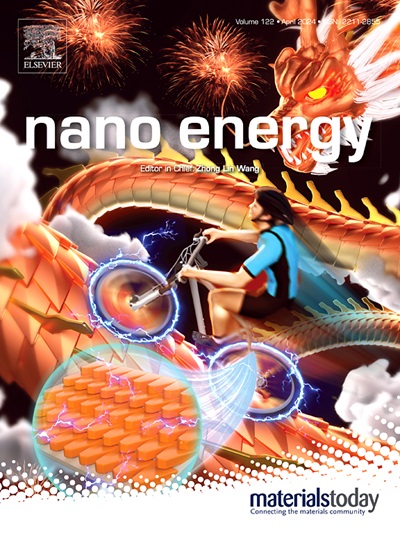通过界面应力分散实现应变敏感的可拉伸三电触觉传感器
IF 16.8
1区 材料科学
Q1 CHEMISTRY, PHYSICAL
引用次数: 0
摘要
在弯曲或拉伸过程中,功能材料的变形和结构活动关系的波动往往会影响柔性触觉传感器的准确性和可靠性。在这项研究中,通过界面应力分散策略开发出了一种高应变不敏感的可拉伸三电触觉传感器(SS-TTS)。通过将软硬度材料与界面环形结构(ICS)相结合,诱导集中的界面应力分散到软基底上,从而有效抑制拉伸过程中传感区域的应变。当使用最佳的 ICS 几何参数(n=10,d = 6.0 mm)时,传感器在 0~70% 的可拉伸范围内表现出超高的应变不敏感性(98%),压力范围宽达 150 kPa。此外,SS-TTS 还可无缝集成到可穿戴腕带中,精确监测脉搏信号,不受人体手腕大小的影响。这证明了它在个性化健康监测应用方面的潜力。此外,还构建了一个 3×3 三电传感器阵列,作为应变敏感可拉伸触控板,用于触觉成像和轨迹识别,进一步扩展了传感器的多功能性。这项工作为未来设计可拉伸电子器件,在可变形条件下实现智能传感应用铺平了道路。本文章由计算机程序翻译,如有差异,请以英文原文为准。

Strain-insensitive stretchable triboelectric tactile sensors via interfacial stress dispersion
The accuracy and reliability of flexible tactile sensors are often compromised by the deformation of functional materials and fluctuations in the structure![]() activity relationship during bending or stretching. In this work, a highly strain-insensitive stretchable triboelectric tactile sensor (SS-TTS) is developed via an interfacial stress dispersion strategy. By integrating softness-stiffness materials with an interfacial circular structure (ICS), the concentrated interfacial stress is induced to disperse onto a soft substrate, effectively suppressing strain in the sensing region during stretching. When the optimal geometric parameters of ICS (n=10, d = 6.0 mm) are used, the sensor demonstrates ultrahigh strain insensitivity (98 %) in the stretchable range of 0–70 % with a wide pressure range up to 150 kPa. Furthermore, the SS-TTS is seamlessly incorporated into a wearable wristband for precise monitoring of pulse signals regardless of human wrist size. This demonstrates its potential for personalized health monitoring applications. Additionally, a 3×3 triboelectric sensor array is constructed to function as a strain-insensitive stretchable touch panel for tactile imaging and trajectory recognition, further expanding the sensor's versatility. This work paves the way for the future design of stretchable electronics tailored for intelligent sensing applications under deformable conditions.
activity relationship during bending or stretching. In this work, a highly strain-insensitive stretchable triboelectric tactile sensor (SS-TTS) is developed via an interfacial stress dispersion strategy. By integrating softness-stiffness materials with an interfacial circular structure (ICS), the concentrated interfacial stress is induced to disperse onto a soft substrate, effectively suppressing strain in the sensing region during stretching. When the optimal geometric parameters of ICS (n=10, d = 6.0 mm) are used, the sensor demonstrates ultrahigh strain insensitivity (98 %) in the stretchable range of 0–70 % with a wide pressure range up to 150 kPa. Furthermore, the SS-TTS is seamlessly incorporated into a wearable wristband for precise monitoring of pulse signals regardless of human wrist size. This demonstrates its potential for personalized health monitoring applications. Additionally, a 3×3 triboelectric sensor array is constructed to function as a strain-insensitive stretchable touch panel for tactile imaging and trajectory recognition, further expanding the sensor's versatility. This work paves the way for the future design of stretchable electronics tailored for intelligent sensing applications under deformable conditions.
求助全文
通过发布文献求助,成功后即可免费获取论文全文。
去求助
来源期刊

Nano Energy
CHEMISTRY, PHYSICAL-NANOSCIENCE & NANOTECHNOLOGY
CiteScore
30.30
自引率
7.40%
发文量
1207
审稿时长
23 days
期刊介绍:
Nano Energy is a multidisciplinary, rapid-publication forum of original peer-reviewed contributions on the science and engineering of nanomaterials and nanodevices used in all forms of energy harvesting, conversion, storage, utilization and policy. Through its mixture of articles, reviews, communications, research news, and information on key developments, Nano Energy provides a comprehensive coverage of this exciting and dynamic field which joins nanoscience and nanotechnology with energy science. The journal is relevant to all those who are interested in nanomaterials solutions to the energy problem.
Nano Energy publishes original experimental and theoretical research on all aspects of energy-related research which utilizes nanomaterials and nanotechnology. Manuscripts of four types are considered: review articles which inform readers of the latest research and advances in energy science; rapid communications which feature exciting research breakthroughs in the field; full-length articles which report comprehensive research developments; and news and opinions which comment on topical issues or express views on the developments in related fields.
 求助内容:
求助内容: 应助结果提醒方式:
应助结果提醒方式:


